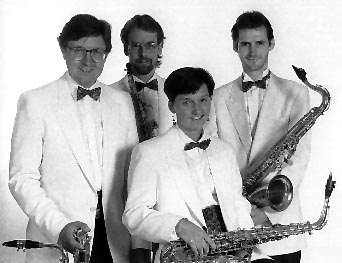|
(Angleterre - England)
|
|||||||||
 |
|||||||||
|
|||||||||
|
The Northern Saxophone Quartet was formed in 1980 and is widely recognised as Britain's premier saxophone ensemble, with a repertoire which ranges from renaissance music to jazz and the avant garde. The group is regularly featured on radio and television. Their debut album received considerable critical acclaim and the quartet gives recitals throughout Britain; in recent years they have performed in the U.S.A., Japan, Italy and Finland. They performed by invitation at the World Saxophone Congress in Spain in 1997, as well as the previous three congresses in Italy, Tokyo and Washington DC. They were guest recitalists and clinicians at the New England Saxophone Symposium, Massachusetts, in 1993, and gave recitals and masterclasses in the USA in 1997. Their CD, "Second Revolution", features music by Phil Woods, Monteverdi, Michael Brecker and George Gershwin. The NSQ are Yamaha artists and clinicians.
Richard Ingham studied music at York University. He has broadcast and recorded many items of the saxophone repertoire and presented masterclasses in conservatoires in the UK and USA, and has recently given solo recitals in Spain, Poland, Scotland and England. His annual residential saxophone courses have proved very popular. Richard is a lecturer at Leeds College of Music and Visiting Professor of Jazz at the University of St Andrews. Chairman of the Clarinet and Saxophone Society of Great Britain (1989-92) and co-director of the British Saxophone Congress from 1990 to 1998, and Director of the British Saxophone Ensemble, Richard has also given many performances on the Yamaha WX7 midi wind controller, has released several albums, and numerous works have been written for him. He is editor of the Cambridge Companion to the Saxophone (Cambridge University Press, 1999). Julia Mills is a freelance saxophonist based in Yorkshire. After studying at Trinity College of Music, she was a member of The Fairer Sax for three years, touring extensively throughout Europe and also in Japan and the Caribbean. She made frequent appearances on radio and television and recorded two albums with the group. She has worked with the RLPO and Halle orchestras. Tony Davis graduated from Trent Polytechnic in 1982, becoming a freelance musician and composer. He appeared as a soloist in the 1990, 1992, 1994 and 1996 British Saxophone Congresses and in 1998 appeared with the British Saxophone Ensemble. He was Director of the School of Music at Wakefield College from 1995 but has recently taken over as the Director of the Faculty of Arts. Together with composing chamber music for saxophone he is also a busy media composer with commissions from both ITV and Channel 4 television companies. As a Yamaha clinician he has given workshops throughout the UK both solo and with the Northern Saxophone Quartet. Nick Turner is a founder member of the NSQ. Born and educated in London, he has been based in the North of England since graduating from Leeds University. He works with most of the major orchestras in the North and Midlands, frequently with ballet companies, and combines a busy freelance career with a very successful teaching practice. Always in demand for his masterclasses, he also gives solo recitals on both clarinet and saxophone, and is a clinician for Yamaha-Kemble. He directs residential saxophone courses, specialising in chamber music and large ensembles. |
|||||||||
|
|||||||||
| Quatuor pour Saxophones by Alfred Desenclos was written in 1964 for the Marcel Mule Quartet, is scored largely in typical French quartet style, although the opening movement makes an unusual feature of setting the soprano against the other three instruments. The lyrical slow movement begins as a simple accompanied melody, which is gradually transformed through levels of tension. A dramatic opening to the finale in rhythmic unison gives way to a delicately textured but intense closing movement. | |||||||||
|